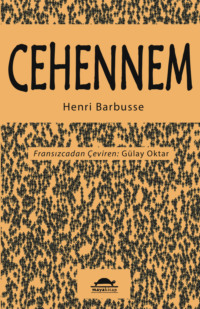 полная версия
полная версияUnder Fire: The Story of a Squad
She leads us into the store-room. Three fat barrels occupy it in impressive rotundity. "Is this your little private store?"
"She knows her way about, the old lady," growls Barque.
The shrew turns on her heel, truculent: "Would you have me ruin myself by this miserable war? I've about enough of losing money all ways at once."
"How?" insists Barque.
"I can see you're not going to risk your money!"
"That's right—we only risk our skins."
We intervene, disturbed by the tone of menace for our present concern that the conversation has assumed. But the door of the wine-cellar is shaken, and a man's voice comes through. "Hey, Palmyra!" it calls.
The woman hobbles away, discreetly leaving the door open. "That's all right—we've taken root!" Lamuse says.
"What dirty devils these, people are!" murmurs Barque, who finds his reception hard to stomach.
"It's shameful and sickening," says Marthereau.
"One would think it was the first time you'd had any of it!"
"And you, old gabbler," chides Barque, "that says prettily to the wine-robber, 'Can't be helped, it's a military order'! Gad, old man, you're not short of cheek!"
"What else could I do or say? We should have had to go into mourning for our table and our wine. She could make us pay forty sous for the wine, and we should have had it all the same, shouldn't we? Very well, then, got to think ourselves jolly lucky. I'll admit I'd no confidence, and I was afraid it was no go."
"I know; it's the same tale everywhere and always, but all the same—"
"Damn the thieving natives, ah, oui! Some of 'em must be making fortunes. Everybody can't go and get killed."
"Ah, the gallant people of the East!"
"Yes, and the gallant people of the North!"
"Who welcome us with open arms!"
"With open hands, yes—"
"I tell you," Marthereau says again, "it's a shame and it's sickening."
"Shut it up—there's the she-beast coming back." We took a turn round to quarters to announce our success, and then went shopping. When we returned to our new dining-room, we were hustled by the preparations for lunch. Barque had been to the rations distribution, and had managed, thanks to personal relations with the cook (who was a conscientious objector to fractional divisions), to secure the potatoes and meat that formed the rations for all the fifteen men of the squad. He had bought some lard—a little lump for fourteen sous—and some one was frying. He had also acquired some green peas in tins, four tins. Mesnil Andre's tin of veal in jelly would be a hors-d'oeuvre.
"And not a dirty thing in all the lot!" said Lamuse, enchanted.
We inspected the kitchen. Barque was moving cheerfully about the iron Dutch oven whose hot and steaming bulk furnished all one side of the room.
"I've added a stewpan on the quiet for the soup," he whispered to me. Lifting the lid of the stove—"Fire isn't too hot. It's half an hour since I chucked the meat in, and the water's clean yet."
A minute later we heard some one arguing with the hostess. This extra stove was the matter in dispute. There was no more room left for her on her stove. They had told her they would only need a casserole, and she had believed them. If she had known they were going to make trouble she would not have let the room to them. Barque, the good fellow, replied jokingly, and succeeded in soothing the monster.
One by one the others arrived. They winked and rubbed their hands together, full of toothsome anticipation, like the guests at a wedding-breakfast. As they break away from the dazzling light outside and penetrate this cube of darkness, they are blinded, and stand like bewildered owls for several minutes.
"It's not too brilliant in here," says Mesnil Joseph. "Come, old chap, what do you want?" The others exclaim in chorus, "We're damned well off here." And I can see heads nodding assent in the cavern's twilight.
An incident: Farfadet having by accident rubbed against the damp and dirty wall, his shoulder has brought away from it a smudge so big and black that it can be seen even here. Farfadet, so careful of his appearance, growls, and in avoiding a second contact with the wall, knocks the table so that his spoon drops to the ground. Stooping, he fumbles among the loose earth, where dust and spiders' webs for years have silently fallen. When he recovers his spoon it is almost black, and webby threads hang from it. Evidently it is disastrous to let anything fall on the ground. One must live here with great care.
Lamuse brings down his fat hand, like a pork-pie, between two of the places at table. "Allons, a table!" We fall to. The meal is abundant and of excellent quality. The sound of conversation mingles with those of emptying bottles and filling jaws. While we taste the joy of eating at a table, a glimmer of light trickles through a vent-hole, and wraps in dusty dawn a piece of the atmosphere and a patch of the table, while its reflex lights up a plate, a cap's peak, an eye. Secretly I take stock of this gloomy little celebration that overflows with gayety. Biquet is telling about his suppliant sorrows in quest of a washerwoman who would agree to do him the good turn of washing some linen, but "it was too damned dear." Tulacque describes the queue outside the grocer's. One might not go in; customers were herded outside, like sheep. "And although you were outside, if you weren't satisfied, and groused too much, they chased you off."
Any news yet? It is said that severe penalties have been imposed on those who plunder the population, and there is already a list of convictions. Volpatte has been sent down. Men of Class '93 are going to be sent to the rear, and Pepere is one of them.
When Barque brings in the harvest of the fry-pan, he announces that our hostess has soldiers at her table—ambulance men of the machine-guns. "They thought they were the best off, but it's us that's that," says Fouillade with decision, lolling grandly in the darkness of the narrow and tainted hole where we are just as confusedly heaped together as in a dug-out. But who would think of making the comparison?
"Vous savez pas," says Pepin, "the chaps of the 9th, they're in clover! An old woman has taken them in for nothing, because of her old man that's been dead fifty years and was a rifleman once on a time. Seems she's even given them a rabbit for nix, and they're just worrying it jugged."
"There's good sorts everywhere. But the boys of the 9th had famous luck to fall into the only shop of good sorts in the whole village."
Palmyra comes with the coffee, which she supplies. She thaws a little, listens to us, and even asks questions in a supercilious way: "Why do you call the adjutant 'le juteux'?"
Barque replies sententiously, "'Twas ever thus."
When she has disappeared, we criticize our coffee. "Talk about clear! You can see the sugar ambling round the bottom of the glass."—"She charges six sous for it."—"It's filtered water."
The door half opens, and admits a streak of light. The face of a little boy is defined in it. We entice him in like a kitten and give him a bit of chocolate.
Then, "My name's Charlie," chirps the child. "Our house, that's close by. We've got soldiers, too. We always had them, we had. We sell them everything they want. Only, voila, sometimes they get drunk."
"Tell me, little one, come here a bit," says Cocon, taking the boy between his knees. "Listen now. Your papa, he says, doesn't he, 'Let's hope the war goes on,' eh?"5
"Of course," says the child, tossing his head, "because we're getting rich. He says, by the end of May, we shall have got fifty thousand francs."
"Fifty thousand francs! Impossible!"
"Yes, yes!" the child insists, stamping, "he said it to mamma. Papa wished it could be always like that. Mamma, sometimes, she isn't sure, because my brother Adolphe is at the front. But we're going to get him sent to the rear, and then the war can go on."
These confidences are disturbed by sharp cries, coming from the rooms of our hosts. Biquet the mobile goes to inquire. "It's nothing," says he, coming back; "it's the good man slanging the woman because she doesn't know how to do things, he says, because she's made the mustard in a tumbler, and he never heard of such a thing, he says."
We get up, and leave the strong odor of pipes, wine, and stale coffee in our cave. As soon as we have crossed the threshold, a heaviness of heat puffs in our faces, fortified by the mustiness of frying that dwells in the kitchen and emerges every time the door is opened. We pass through legions of flies which, massed on the walls in black hordes, fly abroad in buzzing swarms as we pass: "It's beginning again like last year! Flies outside, lice inside.—"
"And microbes still farther inside!"
In a corner of this dirty little house and its litter of old rubbish, its dusty debris of last year and the relics of so many summers gone by, among the furniture and household gear, something is moving. It is an old simpleton with a long bald neck, pink and rough, making you think of a fowl's neck which has prematurely molted through disease. His profile is that of a hen, too—no chin and a long nose. A gray overlay of beard felts his receded cheek, and you see his heavy eyelids, rounded and horny, move up and down like shutters on the dull beads of his eyes.
Barque has already noticed him: "Watch him—he's a treasure-seeker. He says there's one somewhere in this hovel that he's stepfather to. You'll see him directly go on all-fours and push his old phizog in every corner there is. Tiens, watch him."
With the aid of his stick, the old man proceeded to take methodical soundings. He tapped along the foot of the walls and on the floor-tiles.. He was hustled by the coming and going of the occupants of the house, by callers, and by the swing of Palmyra's broom; but she let him alone and said nothing, thinking to herself, no doubt, that the exploitation of the national calamity is a more profitable treasure than problematical caskets.
Two gossips are standing in a recess and exchanging confidences in low voices, hard by an old map of Russia that is peopled with flies. "Oui, but it's with the Picon bitters that you've got to be careful. If you haven't got a light touch, you can't get your sixteen glasses out of a bottle, and so you lose too much profit. I don't say but what one's all right in one's purse, even so, but one doesn't make enough. To guard against that, the retailers ought to agree among themselves, but the understanding's so difficult to bring off, even when it's in the general interest."
Outside there is torrid sunshine, riddled with flies. The little beasts, quite scarce but a few days ago, multiply everywhere the murmur of their minute and innumerable engines. I go out in the company of Lamuse; we are going for a saunter. One can be at peace today—it is complete rest, by reason of the overnight march. We might sleep, but it suits us much better to use the rest for an extensive promenade. To-morrow, the exercise and fatigues will get us again. There are some, less lucky than we, who are already caught in the cogwheels of fatigue. To Lamuse, who invites him to come and stroll with us, Corvisart replies, screwing up the little round nose that is laid flatly on his oblong face like a cork, "Can't—I'm on manure!" He points to the shovel and broom by whose help he is performing his task of scavenger and night-soil man.
We walk languidly. The afternoon lies heavy on the drowsy land and on stomachs richly provided and embellished with food. The remarks we exchange are infrequent.
Over there, we hear noises. Barque has fallen a victim to a menagerie of housewives; and the scene is pointed by a pale little girl, her hair tied behind in a pencil of tow and her mouth embroidered with fever spots, and by women who are busy with some unsavory job of washing in the meager shade before their doors.
Six men go by, led by a quartermaster corporal. They carry heaps of new greatcoats and bundles of boots. Lamuse regards his bloated and horny feet—"I must have some new sheds, and no mistake; a bit more and you'll see my splay-feet through these ones. Can't go marching on the skin of my tongs, eh?"
An aeroplane booms overhead. We follow its evolutions with our faces skyward, our necks twisted, our eyes watering at the piercing brightness of the sky.
Lamuse declares to me, when we have brought our gaze back to earth, "Those machines'll never become practical, never."
"How can you say that? Look at the progress they've made already, and the speed of it."
"Yes, but they'll stop there. They'll never do any better, never."
This time I do not challenge the dull and obstinate denial that ignorance opposes to the promise of progress, and I let my big comrade alone in his stubborn belief that the wonderful effort of science and industry has been suddenly cut short.
Having thus begun to reveal to me his inmost thoughts, Lamuse continues. Coming nearer and lowering his head, he says to me, "You know she's here—Eudoxie?"
"Ah!" said I.
"Yes, old chap. You never notice anything, you don't, but I noticed," and Lamuse smiles at me indulgently. "Now, do you catch on? If she's come here, it's because we interest her, eh? She's followed us for one of us, and don't you forget it."
He gets going again. "My boy, d'you want to know what I say? She's come after me."
"Are you sure of it, old chap?"
"Yes," says the ox-man, in a hollow voice. "First, I want her. Then, twice, old man, I've found her exactly in my path, in mine, d'you understand? You may tell me that she ran away; that's because she's timid, that, yes—"
He stopped dead in the middle of the street and looked straight at me. The heavy face, greasily moist on the cheeks and nose, was serious. His rotund fist went up to the dark yellow mustache, so carefully pointed, and smoothed it tenderly. Then he continued to lay bare his heart to me "I want her; but, you know, I shall marry her all right, I shall. She's called Eudoxie Dumail. At first, I wasn't thinking of marrying her. But since I've got to know her family name, it seems to me that it's different, and I should get on all right. Ah, nom de Dieu! She's so pretty, that woman! And it's not only that she's pretty—ah!"
The huge child was overflowing with sentiment and emotion, and trying to make them speak to me. "Ah, my boy, there are times when I've just got to hold myself back with a hook," came the strained and gloomy tones, while the blood flushed to the fleshy parts of his cheeks and neck. "She's so beautiful, she's—and me I'm—she's so unlike—you'll have noticed it, surely, you that notices—she's a country girl, oui; eh bien, she's got a God knows what that's better than a Parisienne, even a toffed-up and stylish Parisienne, pas? She—as for me, I—"
He puckered his red eyebrows. He would have liked to tell me all the splendor of his thoughts, but he knew not the art of expressing himself, so he was silent. He remained alone in his voiceless emotion, as always alone.
We went forward side by side between the rows of houses. In front of the doors, drays laden with casks were drawn up. The front windows blossomed with many-hued heaps of jam-pots, stacks of tinder pipe-lighters—everything that the soldier is compelled to buy. Nearly all the natives had gone into grocery. Business had been getting out of gear locally for a long time, but now it was booming. Every one, smitten with the fever of sum-totals and dazzled by the multiplication table, plunged into trade.
Bells tolled, and the procession of a military funeral came out. A forage wagon, driven by a transport man, carried a coffin wrapped in a flag. Following, were a detachment of men, an adjutant, a padre, and a civilian.
"The poor little funeral with its tail lopped off!" said Lamuse. "Ah, those that are dead are very happy. But only sometimes, not always—voila!"
We have passed the last of the houses. In the country, beyond the end of the street, the fighting convoy and the regimental convoy have settled themselves, the traveling kitchens and jingling carts that follow them with odds and ends of equipment, the Red Cross wagons, the motor lorries, the forage carts, the baggage-master's gig. The tents of drivers and conductors swarm around the vehicles. On the open spaces horses lift their metallic eyes to the sky's emptiness, with their feet on barren earth. Four poilus are setting up a table. The open-air smithy is smoking. This heterogeneous and swarming city, planted in ruined fields whose straight or winding ruts are stiffening in the heat, is already broadly valanced with rubbish and dung.
On the edge of the camp a big, white-painted van stands out from the others in its tidy cleanliness. Had it been in the middle of a fair, one would have said it was the stylish show where one pays more than at the others.
This is the celebrated "stomatological" van that Blaire was asking about. In point of fact, Blaire is there in front, looking at it. For some long time, no doubt, he has been going round it and gazing. Field-hospital orderly Sambremeuse, of the Division, returning from errands, is climbing the portable stair of painted wood which leads to the van door. In his arms he carries a bulky box of biscuits, a loaf of fancy bread, and a bottle of champagne. Blaire questions him—"Tell me, Sir Rump, this horse-box—is it the dentist's?"
"It's written up there," replies Sambremeuse—a little corpulent man, clean, close-shaven, and his chin starch-white. "If you can't see it, you don't want the dentist to look after your grinders, you want the vet to clean your eyesight."
Blaire comes nearer and scrutinizes the establishment. "It's a queer shop," he says. He goes nearer yet, draws back, hesitates to risk his gums in that carriage. At last he decides, puts a foot on the stair, and disappears inside the caravan.
We continue our walk, and turn into a footpath where are high, dusty bushes and the noises are subdued. The sunshine blazes everywhere; it heats and roasts the hollow of the way, spreading blinding and burning whiteness in patches, and shimmers in the sky of faultless blue.
At the first turning, almost before we had heard the light grating of a footstep, we are face to face with Eudoxie!
Lamuse utters a deep exclamation. Perhaps he fancies once more that she is looking for him, and believes that she is the gift of his destiny. He goes up to her—all the bulk of him.
She looks at him and stops, framed by the hawthorn. Her strangely slight and pale face is apprehensive, the lids tremble on her magnificent eyes. She is bareheaded, and in the hollowed neck of her linen corsage there is the dawning of her flesh. So near, she is truly enticing in the sunshine, this woman crowned with gold, and one's glance is impelled and astonished by the moon-like purity of her skin. Her eyes sparkle; her teeth, too, glisten white in the living wound of her half-open mouth, red as her heart.
"Tell me—I am going to tell you," pants Lamuse. "I like you so much—" He outstretches his arm towards the motionless, beloved wayfarer.
She starts, and replies to him, "Leave me alone—you disgust me!"
The man's hand is thrown over one of her little ones. She tries to draw it back, and shakes it to free herself. Her intensely fair hair falls loose, flaming. He draws her to him. His head bends towards her, and his lips are ready. His desire—the wish of all his strength and all his life—is to caress her. He would die that he might touch her with his lips. But she struggles, and utters a choking cry. She is trembling, and her beautiful face is disfigured with abhorrence.
I go up and put my hand on my friend's shoulder, but my intervention is not needed. Lamuse recoils and growls, vanquished.
"Are you taken that way often?" cries Eudoxie.
"No!" groans the miserable man, baffled, overwhelmed, bewildered.
"Don't do it again, vous savez!" she says, and goes off panting, and he does not even watch her go. He stands with his arms hanging, gazing at the place whence she has gone, tormented to the quick, torn from his dreams of her, and nothing left him to desire.
I lead him away and he comes in dumb agitation, sniffling and out of breath, as though he had run a long way. The mass of his big head is bent. In the pitiless light of eternal spring, he is like the poor Cyclops who roamed the shores of ancient Sicily in the beginnings of time—like a huge toy, a thing of derision, that a child's shining strength could subdue.
The itinerant wine-seller, whose barrow is hunchbacked with a barrel, has sold several liters to the men on guard duty. He disappears round the bend in the road, with his face flat and yellow as a Camembert, his scanty, thin hair frayed into dusty flakes, and so emaciated himself that one could fancy his feet were fastened to his trunk by strings through his flopping trousers.
And among the idle poilus of the guard-room at the end of the place, under the wing of the shaking and rattling signboard which serves as advertisement of the village,6 a conversation is set up on the subject of this wandering buffoon.
"He has a dirty neb," says Bigornot; "and I'll tell you what I think—they've no business to let civvies mess about at the front with their pretty ringlets, and especially individuals that you don't know where they come from."
"You're quite crushing, you portable louse," replies Cornet.
"Never mind, shoe-sole face," Bigornot insists; "we trust 'em too much. I know what I'm saying when I open it."
"You don't," says Canard. "Pepere's going to the rear."
"The women here," murmurs La Mollette, "they're ugly; they're a lot of frights."
The other men on guard, their concentrated gaze roaming in space, watch two enemy aeroplanes and the intricate skeins they are spinning. Around the stiff mechanical birds up there that appear now black like crows and now white like gulls, according to the play of the light, clouds of bursting shrapnel stipple the azure, and seem like a long flight of snowflakes in the sunshine.
As we are going back, two strollers come up—Carassus and Cheyssier. They announce that mess-man Pepere is going to the rear, to be sent to a Territorial regiment, having come under the operation of the Dalbiez Act.
"That's a hint for Blaire," says Carassus, who has a funny big nose in the middle of his face that suits him ill.
In the village groups of poilus go by, or in twos, joined by the crossing bonds of converse. We see the solitary ones unite in couples, separate, then come together again with a new inspiration of talk, drawn to each other as if magnetized.
In the middle of an excited crowd white papers are waving. It is the newspaper hawker, who is selling for two sous papers which should be one sou. Fouillade is standing in the middle of the road, thin as the legs of a hare. At the corner of a house Paradis shows to the sun face pink as ham.
Biquet joins us again, in undress, with a jacket and cap of the police. He is licking his chops: "I met some pals and we've had a drink. You see, to-morrow one starts scratching again, and cleaning his old rags and his catapult. But my greatcoat!—going to be some job to filter that! It isn't a greatcoat any longer—it's armor-plate."
Montreuil, a clerk at the office, appears and hails Biquet: "Hey, riff-raff! A letter! Been chasing you an hour. You're never to be found, rotter!"
"Can't be both here and there, looney. Give us a squint." He examines the letter, balances it in his hand, and announces as he tears the envelope, "It's from the old woman."
We slacken our pace. As he reads, he follows the lines with his finger, wagging his head with an air of conviction, and his lips moving like a woman's in prayer.
The throng increases the nearer we draw to the middle of the village. We salute the commandant and the black-skirted padre who walks by the other's side like his nurse. We are questioned by Pigeon, Guenon, young Escutenaire, and Chasseur Clodore. Lamuse appears blind and deaf, and concerned only to walk.
Bizouarne, Chanrion, and Roquette arrive excitedly to announce big news—"D'you know, Pepere's going to the rear."
"Funny," says Biquet, raising his nose from his letter, "how people kid themselves. The old woman's bothered about me!" He shows me a passage in the maternal epistle: "'When you get my letter,'" he spells out, "'no doubt you will be in the cold and mud, deprived of everything, mon pauvre Eugene'" He laughs: "It's ten days since she put that down for me, and she's clean off it. We're not cold, 'cos it's been fine since this morning; and we're not miserable, because we've got a room that's good enough. We've had hard times, but we're all right now."







